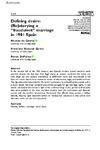Defining desire: (Re)storying a “fraudulent” marriage in 1901 Spain

Use this link to cite
http://hdl.handle.net/2183/35432
Except where otherwise noted, this item's license is described as Atribución-NoComercial-SinDerivadas 3.0 España
Collections
- Investigación (FEDU) [938]
Metadata
Show full item recordTitle
Defining desire: (Re)storying a “fraudulent” marriage in 1901 SpainDate
2018-12-11Citation
de Gabriel, N., Vázquez García, F., & DePalma, R. (2020). Defining desire: (Re)storying a “fraudulent” marriage in 1901 Spain. Sexualities, 23(3), 287-306. https://doi.org/10.1177/1363460718817159
Abstract
[Abstract] In the second half of the 19th century, two Spanish primary school teachers were married despite the fact that their legal status as women rendered this union not only illegal but also publicly scandalous. In 2008 their story was resurrected in the form of a book based on an extensive review of educational, legal, and media archives. The Spanish press responded to the book’s publication by embedding the events within a more recent historical narrative around the struggle for gay marriage rights. In this article, we analyze the events in light of the understandings of sex, gender and sexuality that were available at the time, and then explore both the continuities and discontinuities with the modern interpretive framework that affords these women a lesbian identity, drawing upon Bennett’s notion of “lesbian-like” practices in eras where such identities were not yet conceptualized.
Keywords
Identity
Lesbian
Marriage
Queer
Spain
Lesbian
Marriage
Queer
Spain
Editor version
Rights
Atribución-NoComercial-SinDerivadas 3.0 España Under Sage's Green Open Access policy, the Accepted Version of the article may be posted in the author's institutional repository and reuse is restricted to non-commercial and no derivative uses © The Author(s) 2018
ISSN
1363-4607






